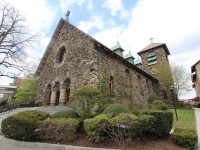White Plains to Consider Historic Preservation Law

At its Monday evening work session the White Plains Common Council was presented with a draft proposal for Historic Preservation legislation.
The 10-page document presented by Planning Commissioner Elizabeth Cheteny proposes an amendment to Title IX of the White Plains Municipal Code, adding a section to be called “Historic Preservation.”
According to Karen Pasquale, Senior Advisor to the Mayor, a team including the Mayor’s office, Planning, Building, Law, City Clerk and City Historian have been working on the draft for about a year.
In the letter presenting the proposed legislation to the Council Commissioner Cheteny said: “The City of White Plains has many significant historic, architectural and cultural resources which are important material representations of its rich and interesting heritage. The proposed legislation is intended to protect and enhance the historic and architecturally and culturally significant buildings, structures, sites, monuments, streetscapes and neighborhoods, which represent distinctive elements of the heritage. It is also intended to foster understanding of and civic pride in the accomplishments of the past. The protection of architecturally significant landmarks will also enhance the city’s attractiveness and will help to insure the harmonious, orderly and efficient growth and development of the city.”
The Historic Preservation Law would also establish a White Plains Historic Preservation Commission responsible for making recommendations to the Mayor and Common Council regarding the designation of local landmarks or districts. The commission would also advise the Council regarding potential acquisition and demolition proposals.
Enforcement, violations and penalties would be included.
In a recent interview with a past president of the White Plains Historical Society, Jack Harrington, a well-known activist for the preservation of historic and green space in White Plains, Examiner Media learned that the first proposal for an historic preservation ordinance was made in 1987 by Susan Habel, Planning Commissioner at the time.
“We just couldn’t get that thing through,” Harrington said, adding that about a year and a half ago the attempt was made to try to resurrect the plan.”
The process of modifying the city’s municipal code requires public hearings and approval by the New York Secretary of State.
If White Plains does adopt an historic preservation law, the city becomes eligible to participate in the Certified Local Government (CLG) Program, a federal-state-local preservation partnership between the National Park Service, the State Historic Preservation Office and qualified local governments. Participation opens doors to funding, technical assistance and other preservation assistance.

